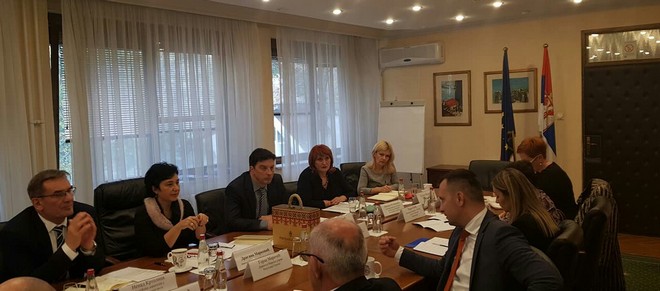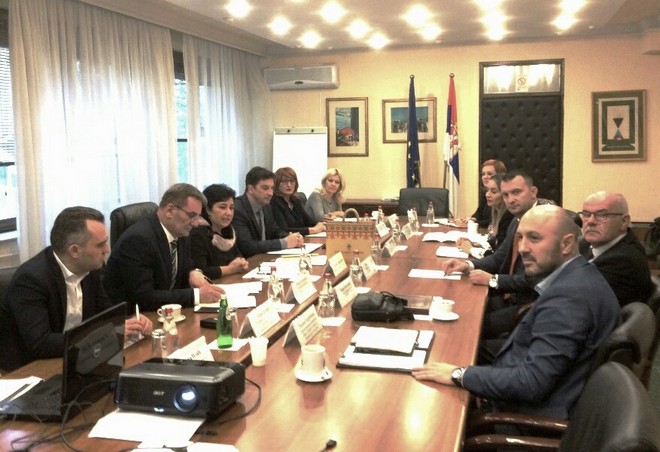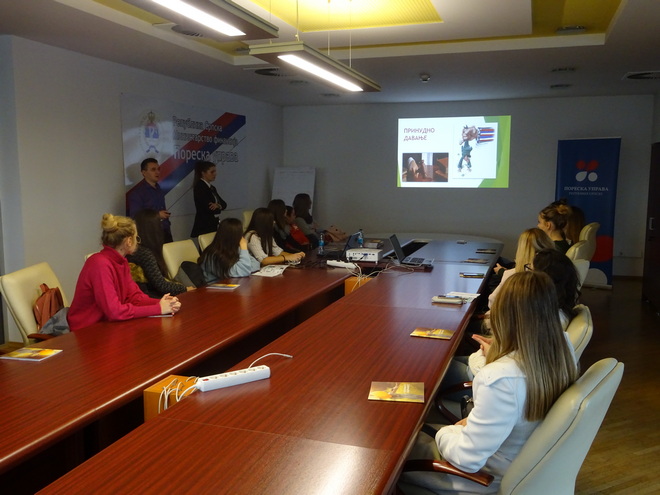
Goran Maričić, Director of Tax Administration of Republic of Srpska, paid a working visit today with his associates to Tax Administration of Serbia, with the aim of further strengthening the cooperation of the two institutions in the future.
During the plenary session of the representatives of the two Tax Administrations, Dragana Marković, Director of Tax Administration of Serbia gave a presentation on the results of work and activities related to transformation of Tax Administration of Serbia, as well as further plans of this institution.
Within this working visit, a series of parallel meetings were held to discuss various topics related to controls, the information system of Tax Administration of Serbia, and modernization and services provided to taxpayers, as well as an internal audit meeting. The interlocutors on both sides exchanged experiences and plans for the future in these areas assessing the cooperation of the two institutions pointing out that it should be even more intensive in the period to come.
With this regard, director Maričić pointed out that cooperation of the Tax Administrations of Republic of Srpska and Serbia is highly important in all areas of their work, especially in terms of taking over and acquiring best practices to improve the operation of these institutions. He also added that it was agreed for the representatives of these two institutions to organize individual working visits in the upcoming period and thus intensify cooperation for mutual benefit.

|
|

In 2019 the Tax Administration of the Republic of Srpska continued to educate high school students throughout the Republic of Srpska in order to present the importance of paying taxes, as well as the significance of tax system and the benefits that arise from it.
On that occasion, education i.e. "Tax Hour" was organized at the RS Tax Administration Headquarters in Banja Luka for students of the Banja Luka School of Economics, and such education was held in previous weeks for high school students in other cities throughout the Republic of Srpska. Moreover, the students of the Banja Luka School of Economics visited the premises of the RS Tax Administration in Banja Luka where they were acquainted with the processes of work in some sectors and the Regional Unit Banja Luka.
Within these educations high school students were introduced to the tax regulations, form and way of work of Tax Administration of the Republic of Srpska as well as RS tax system respectively with existing taxes, procedures and conditions and ways of payment of tax liabilities, rights and obligations of taxpayers. Also, high school students were presented the way of functioning of the Unified System for Registration, Control, and Collection of Contributions as well as the process of fiscalization.
The aim of these activities is rising up the awareness about importance of tax system and paying of tax, as well as benefit that comes from that, either for individual and society. It is about activity continuation of the Tax Administration of Republic of Srpska on education of the youngest population in order to, as coming taxpayers, gain necessary knowledge and realize importance and advantages of regular payment of tax liabilities.
Tax Administration of the Republic of Srpska will continue education of the young in the next period as a key segment in changes of way of thinking in this area throughout visits to educational institutions or students visit to Tax Administration of the Republic of Srpska. Through these activities, we strive to affect on citizen’s awareness, from the youngest to the eldest, that paying the tax strengthen Republic of Srpska in all segments.
|
|

Goran Maricic, Director of the Tax Administration of the Republic of Srpska,
has recently participated at the Annual International Conference of the
Intra-European Organization of Tax Administrations (IOTA), which was hosted by
the Revenue Service of Georgia in Tbilisi.
This year's Conference had the form of a Tax Compliance Technology Showroom
organized to present the biggest collection of recent and innovative digital
solutions in the field of tax compliance. The Showroom created a unique
opportunity for tax administrations to have a direct contact with tax
authorities, businesses and software producers that developed digital solutions
in regard to tax compliance improvement, fraud prevention, delivery of user-
friendly e-services, use of big data and advanced analytics,
artificial intelligence and robotic process automation.
During the Conference, nine different sessions were organized that included
presentations, debates and interactive roundtable sessions addressing practical
solutions for electronic transactions and real-time reporting, monitoring of
movement (transportation) of goods of high fiscal risk, eTax portals and other
advanced solutions.
|
|

Goran Maričić, director of the Tax Administration of the Republic of Srpska,
participated today at the panel "Tax Administration Reform and Fight Against the
Gray Economy", as part of the eighth "Summit of the Governors, Ministers of
Finance and Directors of Tax Administrations of the Region", which was held on
13-15 June 2019 in Bečići, Montenegro.
In addition to the director Maričić, the participants in this panel were also
the directors of Tax Administration of the Federation BiH, the Indirect Taxation
Authority of BiH, then the Assistant Director of the Tax Administration of
Serbia, directors of tax administrations of Montenegro, Croatia, North
Macedonia, Albania, Kosovo * as well as the Advisor to the International
Monetary Fund for the Western Balkans.
Participants within this panel talked about several topics in this area, and
so there were words about the reform and modernization of tax administrations of
the region, i.e. what are the ways to help each other on this path of reform and
modernization. Likewise, challenges imposed on the tax administrations by the
Fourth Industrial Revolution, as well as electronic filling and tax collection
and measures to increase tax administrations efficiency were discussed. In
addition, the key persons of tax administrations of the region also discussed
stronger regional cooperation in the fight against the grey economy, the
importance of tax administrations for the stabilization of public finances, as
well as better collection of public revenues as a condition for reducing the tax
burden. They discussed about significance of the reform of public companies for
tax administration, the tax treatment of excise products, but also unavoidable
and very important topic today, which has been referred to, and it is how to
improve the relationship between the tax administration and taxpayers, i.e. to
strive education before sanctions.
While talking about the achievements of the Tax Administration of the
Republic of Srpska, the director Maričić stated that the digitization of
business processes is important for today's business, with the aim of
strengthening taxpayer services and simplifying procedures. He announced that
electronic filling of all tax returns would be enabled by the end of this year,
as well as the functioning of the e-Box, which, along with the automation of the
process of sending notifications on filing tax returns and payment of tax
liabilities, is a major step forward for this institution in the area of
digitization.
Maričić also said that regional cooperation of control bodies is very
important in the fight against the gray economy, which should certainly be
tackled, and pointed out that the fight against the gray economy is not based
only on prohibitions and inspection measures, but also implies different
activities of the wider community.

|
|

Continuation of the joint struggle against the gray economy in the Republic of Srpska and the protection of workers' rights should be a priority in the coming period, with the
aim of further strengthening of the Republic of Srpska and a better social position of its citizens.
It is concluded after the meeting that has been held today in Banja Luka among representatives of the Tax Administration of the Republic of Srpska, the Inspectorate of the
Republic of Srpska and the Trade Union of the Republic of Srpska, that there is readiness of inspection bodies in the Republic of Srpska to consistently implement all those legal
regulations that have been agreed among social partners (the Government, the Union and employers in the Republic of Srpska).
At the meeting they also discussed about the control of calculation and payment of gross salaries, the prevention of the misuse of the institute of the lowest salary by a number
of unscrupulous employers, as well as on the ways to fight against the grey economy and the possibilities that these three institutions can jointly improve the existing situation.
Goran Maricic, the director of the Tax Administration of the Republic of Srpska, emphasized that the Tax Administration of the Republic of Srpska, in accordance with its
competence, will proceed its continuous controls in the following period, jointly with other inspection bodies with the aim of detection of undeclared work and all with the aim of
combating the grey economy in the Republic of Srpska. He underlined that this institution, as a control body, will consistently proceed in the following period all legal
regulations agreed among social partners in the Republic of Srpska. Maricic emphasized that the Tax Administration of the Republic of Srpska directed a great part of
its activities to combating the grey economy, but he added that the fight against the grey economy is not only based on prohibitions and inspection controls but implies
different activities of wide social community. Moreover, he expressed the expectation that the citizens, workers and other are going to help inspection bodies to detect undeclared
work in a way to report all irregularities they see or they have been exposed.
Zoran Mikanovic, Chief Republic Labor Inspector, emphasized that the labor inspection’s consistent application of the Labor Law greatly complicates the absence of collective
agreements because many norms of laws suggest the collective agreements, especially in the part of the salary control. The collective agreement would precisely determine criteria
for salary calculation, coefficient base amount, pay rates, and similar that greatly would prevent misuse of the institute lowest salary and the inspectors would be given
instruments and tools, which will provide more efficient work.
Ranka Misic, president of the Trade Union of the Republic of Srpska, said that the existing situation should be changed, and the fight against the grey economy has to be
stronger, so in that way she expects the support of inspection bodies in the Republic of Srpska. She specified that the Trade Union of the Republic of Srpska will insist on changes
of the legal regulations and ratification of collective agreements in order to prevent misuses of the institute lowest salary by the certain number of unconscious employers but
also to make it easier to discover the payment of salaries in the hands.
Otherwise, in order to fight against the grey economy and unfair competition, Inspectorate of the Republic of Srpska and the Tax Administration of the Republic of Srpska daily
conduct joint activities and in the following period joint controls of unregistered economic entities are planned with the aim of its introduction into legal flows.
|
|
|
|
|